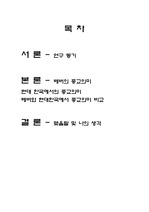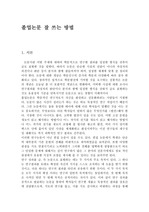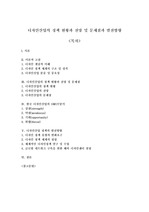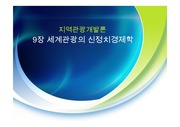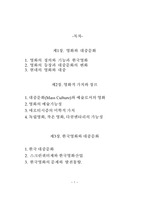

-
 * 본 문서는 배포용으로 복사 및 편집이 불가합니다.
* 본 문서는 배포용으로 복사 및 편집이 불가합니다.
미리보기
서지정보
· 발행기관 : 동방문화대학원대학교 동양학연구소
· 수록지 정보 : 동방문화와 사상 / 4권
· 저자명 : 지준호
목차
논문 초록
Ⅰ. 서 론
Ⅱ. 전통의 일상적⋅학문적 의미
Ⅲ. 전통적 가치의 연원과 변화
Ⅳ. 현재적 의미로서의 전통적 가치의 위상
Ⅴ. 결 론
참고문헌
Abstract초록
본 연구는 정체성의 위기에 봉착해 있는 현 시대에, 과연 우리의 전통사상 및 전통교육이 어떤 역할을 할 수 있을지에 대한 당연한 문제제기의 일환이자 그에 대한 대응의 노력이다.
최근 10-20년 사이 현대 한국사회에서의 전통적 가치를 확인하는 작업들을 주제에 따라 다음과 같이 몇 가지 유형으로 분류해 볼 수 있다. 첫째, 사고방식에 주목한 연구, 둘째, 오늘날 한국인인 지닌 가치들의 지형도를 그리고자 했던 연구, 셋째, 구체적인 가치⋅덕목을 중심으로 하되 중시하고 있는 것(Is) 이 아니라 중시해야할 것(Ought)을 분석한 연구, 넷째, 전통적 가치와 시민사회와의 관계에 관한 연구 등이 있다. 이처럼 전통적 가치에 관한 다양한 논의 들은 확산의 측면에서 긍정적으로 볼 수 있지만, 반면 일정 부분 경계해야 할 부분들도 있다.
‘현재적 의미로서의 전통’은 전래된 것으로서의 전통에서 현재적 의미를 추출하는 것이라기보다는, 역으로 현재적 의미가 어떠한 전통적 사유와 맞닿아 있는가를 논의하는 것에 가깝다. 즉, 과거가 현재와 미래에도 여전히 유효하다는 입장이 아니라, 현재와 미래에 유효한 것들이 과거의 전통으로부터 연원 한다는 점을 논의하는 것이다. 따라서 전통과 전통교육에 대한 인식 정도를 파악하기 위해 어린이와 청소년, 성인세대를 대상으로 한 실태조사는 이러한 접근에 시사하는 바가 매우 크다.
전통(傳統)이란 이전 세대로부터 전해져 내려온 것으로 현재의 생활문화가 유지되고 발전하는데 있어서 긍정적인 역할을 할 수 있는 양식과 태도 등을 의미한다. 전통문화의 전수와 계승은 우리 민족문화의 발전과 함께하며 영구히 이어지고 지속되는 역사적 실체로며, 진정한 전통문화의 계승은 우리 역사를 긍정적으로 보는 안목부터 키워나가는데 있다고 할 수 있다.영어초록
This study is an effort to respond to the question of what kind of role our traditional ideas and traditional education can play in the present age when the identity crisis is in crisis.
In recent 10-20 years, the tasks that identify traditional values in modern Korean society can be divided into several types according to the themes. First, research focused on the way of thinking; second, research that sought to figure out the topography of the values of Koreans today; and third, research focused on specific values and virtues as in the above study, but analyzed what should be emphasized, not what we are currently focusing on; and fourth, research on the relationship between traditional values and civil society. It is positive that various discussions on traditional values are spreading like this, but there are some parts to be warned.
'Tradition as a present meaning' is not a matter of extracting the present meaning from the tradition which has been introduced, but conversely it is close to discussing what the current meaning is in relation to the traditional reason. In other words, it is not a position that the past is still valid now and in the future, but that what is valid for the present and the future is derived from the past tradition. Therefore, in order to understand the perception of tradition and traditional education, the survey of children, adolescents and adult generations is very suggestive of this approach.
Tradition refers to cultural forms and attitudes that can be transmitted from previous generations and play a positive role in maintaining and developing the present culture. The inheritance and succession of traditional culture is a historical reality which is permanently connected with the development of national culture, and it can be said that the true inheritance of traditional culture is from the perspective of seeing our history positively.참고자료
· 없음태그
-
자료후기
-
자주묻는질문의 답변을 확인해 주세요

꼭 알아주세요
-
본 학술논문은 (주)코리아스칼라와 각 학회간에 저작권계약이 체결된 것으로 AgentSoft가 제공 하고 있습니다.
본 저작물을 불법적으로 이용시는 법적인 제재가 가해질 수 있습니다. -
해피캠퍼스는 구매자와 판매자 모두가 만족하는 서비스가 되도록 노력하고 있으며, 아래의 4가지 자료환불 조건을 꼭 확인해주시기 바랍니다.
파일오류 중복자료 저작권 없음 설명과 실제 내용 불일치 파일의 다운로드가 제대로 되지 않거나 파일형식에 맞는 프로그램으로 정상 작동하지 않는 경우 다른 자료와 70% 이상 내용이 일치하는 경우 (중복임을 확인할 수 있는 근거 필요함) 인터넷의 다른 사이트, 연구기관, 학교, 서적 등의 자료를 도용한 경우 자료의 설명과 실제 자료의 내용이 일치하지 않는 경우
“동방문화와 사상”의 다른 논문도 확인해 보세요!
-
『周易』 互體의 錯綜關係 28 페이지
착종(錯綜)이란 말은 당(唐)대의 공영달(孔穎達)이 맨 처음 사용하였고 래지덕(來知德)은 6개의 爻는 변한 후에도 여전히 錯綜과 中爻의 변화로 음양순환 (陰陽循環)의 이치를 체현하고 있다고 했다. 錯卦란 陰은 陽으로, 陽은 陰으로 치환(置換)시킨 경우를 말하며 綜卦란 卦를 거꾸로 뒤집어 도치(倒置)시킨 卦를 말한다. 錯綜卦란 錯이나 綜을 해도 같은 卦가 되.. -
论≪荀子≫中性伪之“伪” 14 페이지
『荀子』 중에는 “위”(伪)자는 다양한 의미를 내포하고 있으나 주로 후 천적인 인위적임을 가리키며, 선천적인 “성”(性)에 상대적 개념이다. “성 |”은 주로 악하며 “위”는 주로 선하다. 즉 “성”은 선을 향할 수도 있고 악을 향할 수도 있지만, 그러나 “성”을 따를 때 외려 악에 이르기가 쉽다. “위”의 목적은 바로 “화성”(化性) 즉 성이 되게 하는데.. -
试析儒家礼义观的精神实质 18 페이지
전통 유가에서 제창했던 “군신부자”(君臣父子)의 “예의관”은 고대 권귀예제주의(权贵礼制主义)라는 심각한 낙인이 찍혀 있다. 지금도 현재 여전히 중국 사회생활 중에 침전되어 있다. 특히 관직을 근본으로 유지하려는 측면에서 엄중한 부작용을 일으키고 있다. 그로 인해 현재 우리는 이론적으로 중국사회의 정의 문제라는 중요한 관건으로 바꾸어 해답을 찾고자 한다. 즉.. -
최병헌의 기독교 수용과 전통 지식 재해석 20 페이지
최병헌의 종교관은 문명론과 기독교적 세계관이 만나는 지점에서 형성되었다. 여기서는 그의 대표작이라 할 수 있는 『성산명경』, 『만종일련』, 『한철집요』를 중심으로 그의 종교 담론이 지니는 의미를 전통 지식의 재편이라는 측면에서 고찰했다. 문명론과 기독교 세계관의 접합을 확인할 수 있는 『성산명 경』은 존 번연의 『천로역정』에 비견될 정도로 한국 초기 기독교.. -
한비(韓非)의 법술세론(法術勢論) 34 페이지
본문에서는 법술세론의 측면에서 현행본 『한비자』에 반영된 상앙, 신불해, 신도의 사상을 중심으로 한비와의 연계성을 검토하였다. 한마디로 한비의 법술세 이론은 법가의 선구자와 선행 법가의 전개 과정을 거쳐 점차적으로 정립된 것이다. 특히 상앙, 신불해, 신도 등의 정치적 경험과 정책 방향은 한비의 법치론을 정립하기 위한 재료와 근거가 되었다. 사실 한비의 법..
-
정가6,100원
-
지식판매자
-
페이지24 페이지
어도비 PDF
-
최초등록일2023.04.03
-
최종저작일2018.02
-
찾으시던 자료가 아닌가요?
지금 보는 자료와 연관되어 있어요!
문서 초안을 생성해주는 EasyAI



